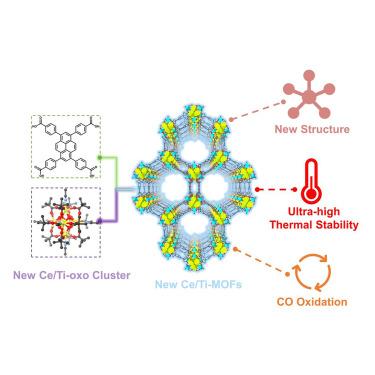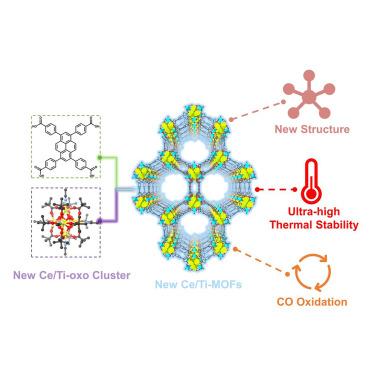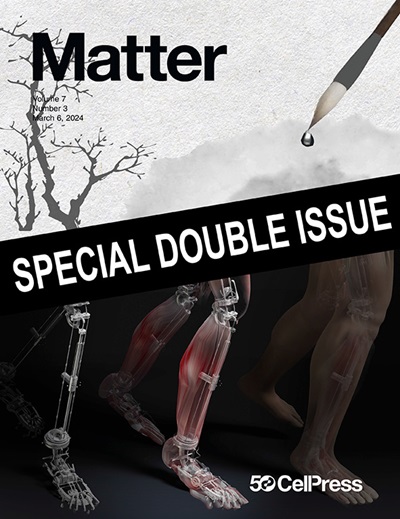铈/钛金属有机框架的进展:一氧化碳氧化过程中无与伦比的稳定性
IF 17.5
1区 材料科学
Q1 MATERIALS SCIENCE, MULTIDISCIPLINARY
引用次数: 0
摘要
由于铈基材料具有优异的催化性能,开发基于铈-氧簇的热稳定金属有机框架(MOFs)引起了广泛关注,但这一工作仍具有挑战性。在这项工作中,我们报告了一种未报道过的 Ce4Ti2-TMA (CeIV4TiIV2O4(OH)4(C(CH3)3COO)12-3H2O-3MeCN)团簇的合成,它是组装稳健的 Ce/Ti-MOFs 的理想来源。利用该簇,我们构建了两种等结构的 MOFs,分别命名为 NU-3000 和 NU-3001。单晶 X 射线衍射分析证实,这些 MOFs 是具有 12 个配位 Ce3Ti3 节点的介孔结构。此外,结构分析还显示了一种平面三角形节点结构,这可能是这些 MOFs 具有出色热稳定性的原因。最后,这两种 MOFs 对高温(250°C)一氧化碳氧化显示出催化活性,并保持了显著的孔隙率,强调了这些材料在实际催化条件下的热稳定性。从 Ce4Ti2-TMA 簇直接合成热稳定性好的 Ce/Ti-MOFs 将为未来基于 Ce/Ti-MOF 的催化剂开发铺平道路。本文章由计算机程序翻译,如有差异,请以英文原文为准。


Advancements in cerium/titanium metal-organic frameworks: Unparalleled stability in CO oxidation
Due to the excellent catalytic properties of Ce-based materials, the development of thermally stable metal-organic frameworks (MOFs) based on Ce-oxo clusters has attracted significant attention but remains challenging. In this work, we report the synthesis of an unreported Ce4Ti2-TMA (CeIV4TiIV2O4(OH)4(C(CH3)3COO)12·3H2O·3MeCN) cluster, which serves as an ideal source for the assembly of robust Ce/Ti-MOFs. Using this cluster, we constructed two isostructural MOFs, denoted as NU-3000 and NU-3001. Single-crystal X-ray diffraction analysis confirms these MOFs as mesoporous structures with 12-coordinated Ce3Ti3 nodes. Furthermore, structural analysis reveals a plane triangular node structure that likely contributes to the excellent thermal stability of these MOFs. Finally, both MOFs show catalytic activity toward high-temperature (250°C) CO oxidation and maintain significant porosity, emphasizing the thermal stability of these materials under practical catalytic conditions. The straightforward synthesis of thermally robust Ce/Ti-MOFs from the Ce4Ti2-TMA cluster will pave the way for future Ce/Ti-MOF-based catalyst development.
求助全文
通过发布文献求助,成功后即可免费获取论文全文。
去求助
来源期刊

Matter
MATERIALS SCIENCE, MULTIDISCIPLINARY-
CiteScore
26.30
自引率
2.60%
发文量
367
期刊介绍:
Matter, a monthly journal affiliated with Cell, spans the broad field of materials science from nano to macro levels,covering fundamentals to applications. Embracing groundbreaking technologies,it includes full-length research articles,reviews, perspectives,previews, opinions, personnel stories, and general editorial content.
Matter aims to be the primary resource for researchers in academia and industry, inspiring the next generation of materials scientists.
 求助内容:
求助内容: 应助结果提醒方式:
应助结果提醒方式:


